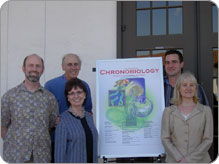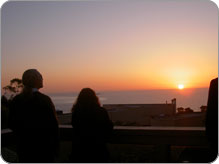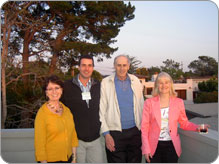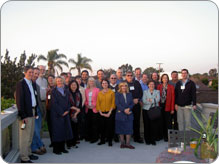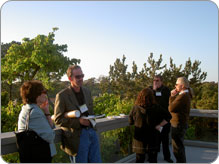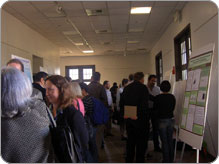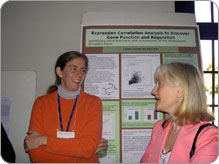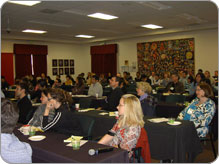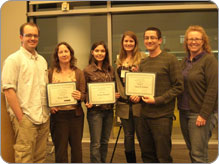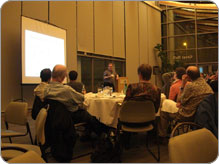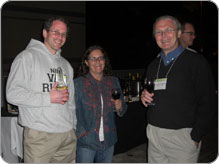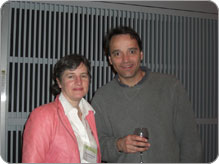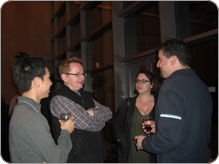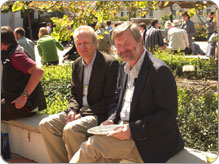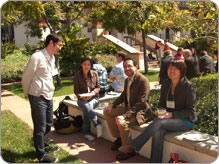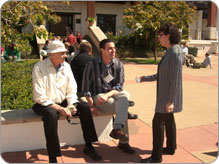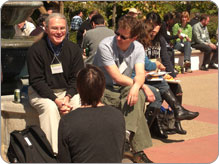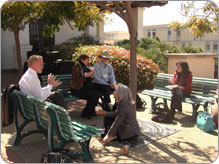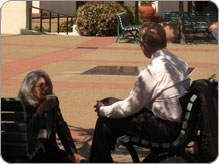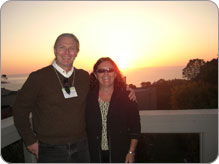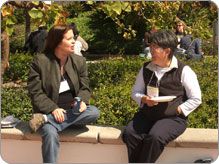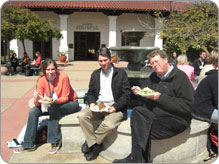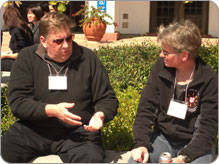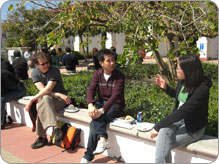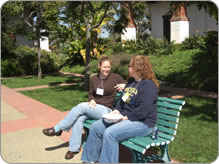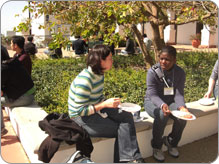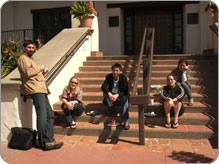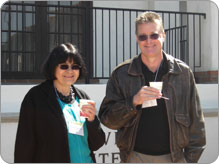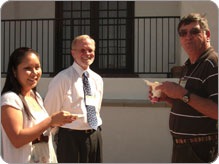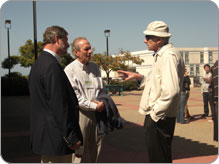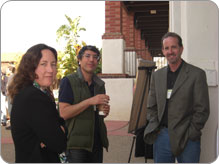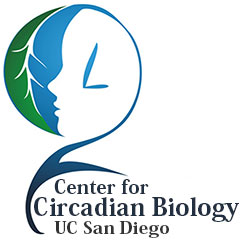CCB Symposium:
From Cells to the Clinic
UCSD's newly formed Center for Chronobiology (CCB) hosted an inaugural chronobiology symposium held March 10-12, 2010. The theme for the symposium was "From Cells to the Clinic."
We invited a select, stellar group of chronobiologists from around the country and beyond, and a few local colleagues, to speak at this first annual UCSD Chronobiology Symposium. There was strong participation from our 25 PIs here in the CCB and their research personnel, as well as registrants from other institutions.
The aims of the conference are to:
- Provide participants with a comprehensive view of modern Chronobiology.
- Exchange a broad spectrum of ideas and techniques in Chronobiology.
- Promote interactions among the faculty and lab personnel of the UCSD Chronobiology Center, the invited speakers, and other participants.
- Further acquaint the speakers, their groups, and other registrants with the depth and breadth of Chronobiology research conducted at UCSD.
Schedule
WEDNESDAY – March 10, 2010
Session I: Cells & Circuits
Institute of the Americas Hotel Auditorium
1:30 pm - 4:30 pm
Moderator: Susan Golden
Stu Brody (UC San Diego) – History of Chronobiology at UCSD
Jeff Hasty (UC San Diego) – Genetic Clocks from Engineered Oscillations
Erin O'Shea (Harvard University) – Timekeeping with a Three-Protein Circadian Clock
Jay Dunlap (Dartmouth Medical School) – Genetic and Molecular Dissection of the Neurospora Clock
Paolo Sassone-Corsi (UC Irvine) – Metabolism and Epigenetics: The Clock Connection
THURSDAY – March 11, 2010
Session II: Pacemakers & Networks
Institute of the Americas Weaver Center
9:00 am - 12 noon
Moderator: David Welsh
Erik Herzog (Washington University) – Ways to Deal with Noisy Neighbors: Circadian Precision in the SCN
Horacio de la Iglesia (University of Washington) – SCN Neuronal Oscillators: "What We've Got Here is a Failure to Communicate"
Michael Nitabach (Yale University) – Systems Physiology of the Drosophila Circadian Control Network
Frank Doyle (UC Santa Barbara) – Robust Circadian Timekeeping in Networks of Neurons
Buffet Lunch: 12:00 pm – 1:15 pm
Institute of the Americas Plaza
POSTER SESSION: 1:15 pm – 4:00 pm
Institute of the Americas Arango Foyer
FRIDAY – March 12, 2010
Session III: Inputs & Outputs
Institute of the Americas Hojel Auditorium
9:00 am - 12 noon
Moderator: Michael Gorman
Lynn Hasher (University of Toronto) – Changes in Cognitive Functioning Across the Day
Randy Nelson (The Ohio State University) – Photoperiod Effects on Brain and Behavior
Stacey Harmer (UC Davis) – Exploring Links Between Clock and Hormone Signaling Networks
C. Robertson McClung (Dartmouth College) – Do You Know Your ABCs? Arabidopsis and Brassica Clocks
Buffet Lunch: 12:00 pm – 2:00 pm
Institute of the Americas Plaza
Session IV: From Lab to Clinic
Institute of the Americas Hojel Auditorium
2:00 pm – 5:00 pm
Moderator: Sonia Ancoli-Israel
Ralph Greenspan (UC San Diego) – Homology Without Anatomy: Sleep in Drosophila
Samer Hattar (Johns Hopkins University) – Vision Beyond Image Formation: The Role of Melanopsin Cells in Regulating Mammalian Physiology
Elizabeth Klerman (Harvard University) – Uncovering Residual Effects of Chronic Sleep Loss on Human Performance
Phyllis Zee (Northwestern University) – Circadian Rhythm Sleep Disorders: Implications for Physical and Mental Health
Keynote Session & Dinner
UCSD Great Hall
5:30 pm – 6:30 pm – Happy Hour
6:30 pm – 8:30 pm – Buffet Dinner and Keynote Talk
Steve Kay (UC San Diego) – Large-Scale Biology Approaches to Circadian Transcriptional Networks
Invited Speakers
| Horacio de la Iglesia University of Washington |
Steve Kay UC San Diego |
| Frank Doyle UC Santa Barbara |
Elizabeth Klerman Harvard University |
| Jay Dunlap Dartmouth Medical School |
C. Robertson McClung Dartmouth College |
| Ralph Greenspan UC San Diego |
Randy Nelson The Ohio State University |
| Stacey Harmer UC Davis |
Michael Nitabach Yale University |
| Lynn Hasher University of Toronto |
Erin O'Shea Harvard University |
| Jeff Hasty UC San Diego |
Paolo Sassone-Corsi UC Irvine |
| Samer Hattar Johns Hopkins University |
Phyllis Zee Northwestern University |
| Erik Herzog Washington University |
Poster Session
There were 4 cash prizes of $150 each awarded to the 4 best posters.
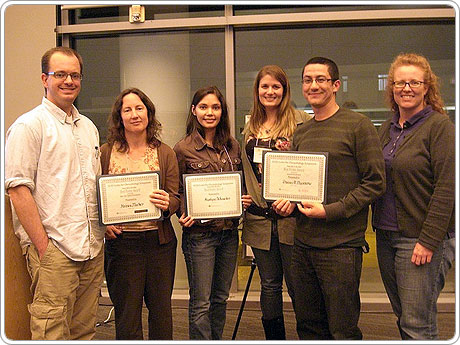
1st Place: Katja Lamia, from Salk Ron Evans' Lab
Title: Phosphorylation of Cryptochromes by the Energy Sensor AMPK Enables Metabolic Clock Input.
2nd Place: Kristen Meeker, from UC Santa Barbara
Title: Wavelet Analysis Reveals Period Wandering in Circadian Neurons.
3rd Place: Analyne Schroeder, from UCLA
Title: Can Time Exercise Rescue Diurnal & Circadian Rhythms of HR & Clock Gene Expression in VIPKO Mice.
4th Place: Dmitri A. Nusinow - UCSD Steve Kay's lab
Title: Mass Spectrometry Based Identification of a ELF3 Containing Diurnally-regulated Complex.
We'd like to thank our sponsors, Johnson & Johnson and the Bay City Capital Foundation for their support of our inaugural symposium.
Directions
From Interstate 5 NORTH:
Exit at Genesee Avenue, turn right (west)
Turn left at North Torrey Pines Road (near the top of the hill)
Turn left on Pangea Drive
Pangea Parking structure will be on your left
From Interstate 5 SOUTH:
Exit at La Jolla Village Drive, turn left (west)
Continue straight onto North Torrey Pines Road
Turn right on Pangea Drive Pangea
Parking structure will be on your left
Campus Map:
Directions to the Institute of Americas on the UCSD campus
http://maps.ucsd.edu
Symposium Flyer
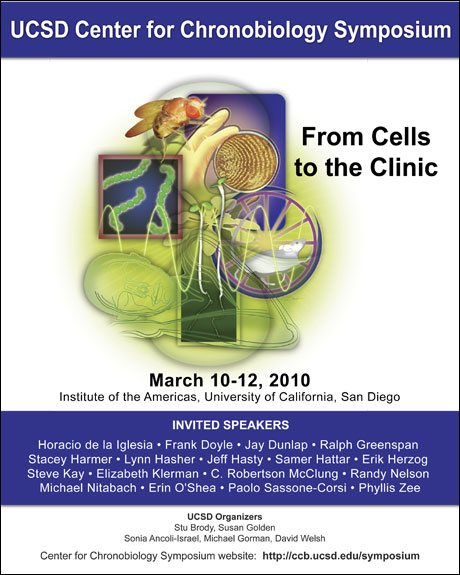
Please click here to download the symposium flyer.
Organizing Committee:
- Stu Brody (Co-Director, CCB)
- Susan Golden (Co-Director, CCB)
- Sonia Ancoli-Israel (UCSD Department of Psychiatry)
- Michael Gorman (UCSD Department of Psychology)
- David Welsh (UCSD Department of Psychiatry)
For additional information, please contact:
Terry Peters
Business Manager
Center for Chronobiology (CCB)
University of California, San Diego
Phone: (858) 534-7753
E-mail: tpeters@ucsd.edu
